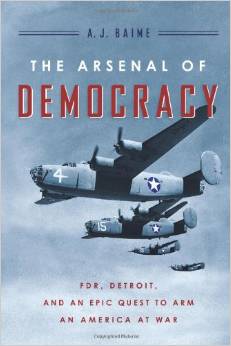On the night of December 29, 1940, at the very same moment the Luftwaffe was raining down bombs over London, American President Franklin Roosevelt addressed the largest radio audience ever gathered. Calling upon the whole of American industry to commit itself to war material production, he declared the United States would become “the great arsenal of democracy” through which European fascism would be defeated. Journalist A.J. Baime’s new book, The Arsenal of Democracy: FDR, Detroit, and an Epic Quest to Arm an America at War, is about how Detroit—and specifically—the Ford Motor Company took up Roosevelt’s challenge. Determined to “out-build Hitler,” the Ford Motor Company erected Willow Run, the largest aircraft factory ever built, with the aim of producing B-24 Liberators in assembly line fashion. Ford executives astonished the world by claiming the company could turn out “a bomber an hour.”
One might expect this 364 page book to be relatively dry, to be inundated with production quotas and other statistics. Quite the contrary. The story-like narrative is riveting (no pun intended!) and deeply personal. The strained relationship between cantankerous Henry Ford and his son, Edsel, is a common theme throughout. Although Edsel was company president, his war production program was met with stern resistance from his pacifist and anti-Semitic father. Baime himself openly states in the prologue, that among other things, “This book is about a father and a son… and the war that tore them apart.”
The inner workings of the Ford Motor Company are examined in detail, revealing an assortment of tensions such as race riots, labor strikes, and complex power struggles. Involved in these tensions are a cast of dynamic characters. Among them: aviator Charles Lindberg, who, like Henry Ford, was suspected of being a Nazi sympathizer, despite his important work as a test pilot; Harry Bennett, the head of the company’s internal security force,who was nothing short of a thug; and “Cast Iron” Charlie Sorenson, the genius of production directly responsible for the “bomber an hour” miracle.
The war had a profound impactupon the Motor City, which at that time was the fourth largest city in the United States. The massive influx of factory workers created housing nightmares. To cope with this mass migration, a government-built housing district, nicknamed “Bomber City” sprang up almost overnight. A melting pot of race, sex, and class, life in Bomber City is characterized as “a clash of cultures.”Elements of social history are integrated into the narrative in the form of anecdotal tidbits, helping to bring the story to life.
Baime focuses primarily on the production of B-24 Liberators in the Willow Run plant. Attention to tanks, vehicles like the Willys Jeep, munitions, and other machinery is shallow at best. Similarly, his handling of female war workers embodied by the mythological Rosie the Riveter is not quite adequate.
Without making exaggerated claims, Baimepresents the subtle argument that Ford’s heavy bombers gave the Allies a critical edge in the war. Important military engagements, such as Operation Tidal Wave (the bombing of oil refineries in Ploiești, Romania), the Normandy Invasion, and othersare highlighted.
This book, which came out in June 2014, is particularly timely considering Willow Run was recently spared from the wrecking ball thanks to the Save the Willow Run Bomber Plant campaign. For those connected with the campaign, this book will be of particular interest. And while in recent years the city of Detroit conjures up images of decline, it is refreshing to remember another Detroit—the bustling Detroit that did more than its part to help the Allies win World War II.
The Arsenal of Democracy is anabsorbing monograph. Sure, it could be more thorough in certain areas, but we must remember, it is written primarily for the lay person, not the expert. With short chapters typically between 10-12 pages, and a masterfully written narrative, it is highly accessible. Many readers will likely find the book a page-turner. The major contribution of this book lies in Baime’s ability to present an exciting, inside look at the inner workings of the Ford Motor Company throughout the course of World War II.This is what makes it original. The Arsenal of Democracy is well researched. Baime draws from variety of primary and secondary sources. His grasp of historical context is very good. Grand in scope, yet littered with interesting (and often unexpected) details, Baime’s history of the Ford Motor Company during World War II is captivating. In sum, The Arsenal of Democracy is a delightful read.
Reviewed by Nate Sullivan for War History Online
THE ARSENAL OF DEMOCRACY: FDR, DETROIT, AND AN EPIC QUEST TO ARM AN AMERICA AT WAR
By AJ Baime.
Houghton Mifflin Harcourt
ISBN-10: 0547719280
ISBN-13: 978 0 54771 928 3
